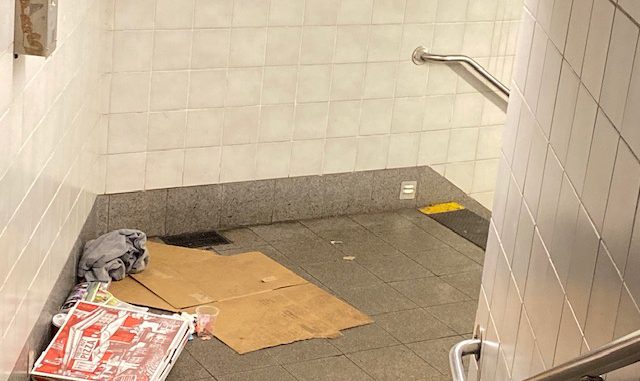
Finals week is nigh, and per usual, all working spaces are congested with students hoarding computers for what I hope is for productive use. It was still early, around 11, and I was hunting for any available seats at the Library Cafe. My search took me to the farthest corner from the remnants of Starbucks and there, something struck me odd. At the last computer, closest to the windows, sat a sleeping individual whose face looked small compared to the multiple items of clothing too heavy for the weather. Litters of worn-out bags with seams bulging like veins stood close and a suitcase whose appearance mirrored the age of its owner also functioned as a footstool. Like marked territory, there was a ring of space around where no one sat.
Consider it rude or my right, I broke into the empty space. I didn’t do it because those were the only computers left, I did it because I wanted to know more. This scene is too familiar for someone who frequents the MTA and Starbucks in the city, but witnessing this inside a college setting is a first, and something too heavy to bear.
That individual is homeless.
Homelessness inside college campuses certainly isn’t unheard of, it’s just mostly unseen. A 2018 survey revealed out of the 22,000 CUNY students who participated, almost half responded they were either homeless or facing food insecurity. But many of them aren’t dressed or look in the way we perceive homeless people to be. There are myriad reasons why a large population of poverty-stricken students is concentrated in CUNY, one of which we can define if we consider the options available to them for higher education: going to CUNY, taking out massive loans or dropping out. Government assistance such as the Excelsior Scholarship Program didn’t help either. When introduced, the number of praises and applauds set it high on a pedestal, proving nothing but a flop that shattered more dreams than it did to help achieve. Statistics show that only 2.3% of students attending CUNY’s senior colleges benefited from the Excelsior program, while only 0.9% of the 95,951 students attending two-year community colleges did. Statewide, only 20,086 students received the award from the Excelsior program out of the 633,543 undergraduates.
But apart from statistics, some of the day-to-day activities at BC also go against financially-strapped students. The food Metropolitan Food Services dishes out in Boylan Hall is designed to milk as much money from students as possible. For the past year, they have been charging for utensils and constantly upping prices despite their lousy, unprofessional services.
Whether Brooklyn College is tackling these problems in the student body is unknown. On BC’s main website, the only resources to be found are a few links that bring users to organizations that can help with homelessness. No information is available about the actions our institution is taking to combat it. NYPIRG, a popular organization at BC, used to have homelessness as one of their issues of interest; however, a recent handout given by one of their activists shows that homelessness is no longer listed as a priority. Maybe, every club could also play a part in this by directing a portion of their funds into a pool that would aid this cause.
As invisible as this plight is, we can’t do much to ameliorate it if no one talks about it. The time is now for the student body to rise up in solidarity and bring it to the school’s attention that more assistance is needed.
As I wrote this, I couldn’t help but lament on the fact that I hadn’t taken time in my college career to seek opportunities to be a part of a greater cause. Instead, I focused too much time within and became selfish, only looking at college as a time to build memories only for myself. Had I been more about others and more proactive, perhaps I would have created something helpful that would fight to provide means of consistency, security, and basic needs for those in need. This realization renders me shameful and I deeply apologize for everything I could’ve done about this, but did not.
I can only ask those who feel the same conviction as I do to not make the same mistake, and instead do something that would help others. Not only would it solve problems around you, but it would always elevate your knowledge and prestige in doing things that are selfless and philanthropic for your community. Don’t get too wrapped up in reveries or parties in your duration here. Fill the time with acts of kindness and productivity for yourself and others. Perhaps the best way to put it would be, “Thou shalt love thy neighbour as thyself” (Matthew 22:37-39).
Bless.
